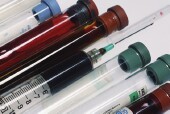They noted the immune system mounts a response against specific antigens, or proteins, produced by lung tumors in their early stages of development.
"This kind of immune response won't necessarily kill the tumor, but it can act as a canary in a coal mine, signaling lung cancer at an early stage, before actual symptoms emerge. It is an important step toward developing a biomarker-based blood test for the early detection of lung cancer," Dr. Samir M. Hanash, head of the Molecular Diagnostic Program in the Public Health Sciences Division at the Hutchinson Center, said in a news release.
Hanash and colleagues tested the sensitivity and specificity of three antigens linked to early stage, pre-symptomatic lung cancer -- annexin1, 14-3-3 theta, and LAMR1. The researchers used blood samples taken from 85 current or former smokers within a year of being diagnosed with lung cancer and blood samples from 85 current or former smokers who didn't develop lung cancer.
The three antigens were found in the blood of 51 percent of the smokers who developed lung cancer and in 18 percent of those who didn't develop the disease.
"The fact that we got a signal like this with just three biomarkers is very significant. If we enlarge this (biomarker) panel by adding a few more, we could develop a blood test with sufficient sensitivity and specificity for detecting lung cancer much earlier than current screening methods allow," Hanash said.
The study was published online Sept. 15 in the Journal of Clinical Oncology.
Within five years, it may be possible to have a blood test that can be used in conjunction with CT scans and other imaging techniques to improve early detection of lung cancer in high-risk people, Hanash said.
He also said this method may prove effective in early detection of other common kinds of cancer.
"If we could identify those antigens that provide the best signature for not only lung cancer, but also for cancers of the colon, breast, prostate, ovary and the like, then with the tiniest drop of blood, we could have a screening test for all the common types of cancer to catch them at their earliest stages, when cure rates are high. That would be phenomenal," Hanash said.
More information
The National Cancer Institute has more about lung cancer.
Attribution: -- Robert PreidtSOURCE: Fred Hutchinson Cancer Research Center, news release, Sept. 15, 2008
Copyright © 2008 ScoutNews, LLC
 . All rights reserved.
. All rights reserved.HealthDayNews articles are derived from various sources and do not reflect federal policy.
omhrc.gov does not endorse opinions, products, or services that may appear in news stories.


